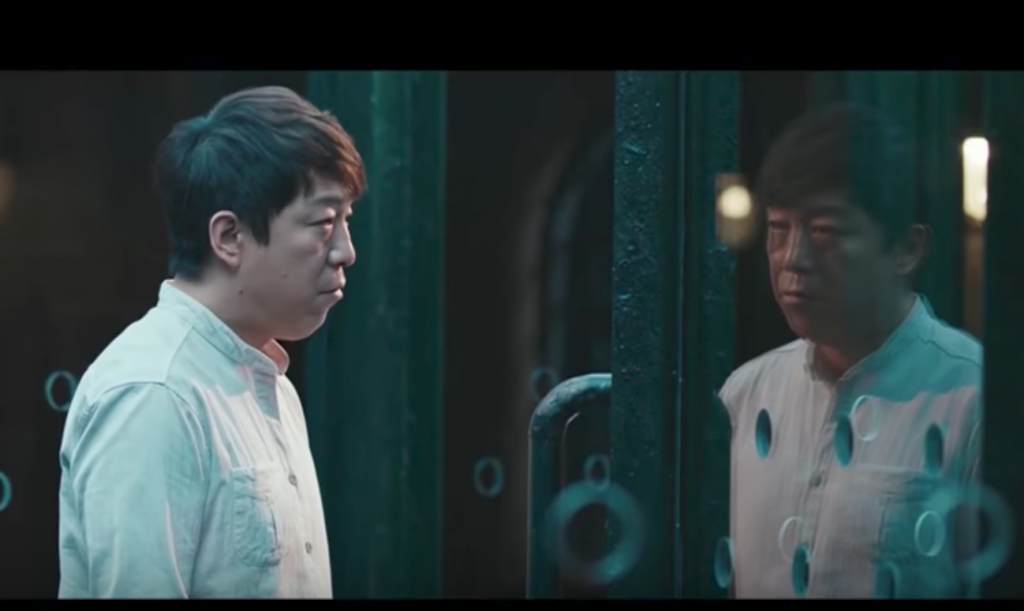Every day while CFI’s Hollywood readers take in the business of the Chinese film industry, the actual movies can sometimes seem exotic or remote. But in major US cities, mainstream Chinese films are increasingly available: thanks to Wanda’s purchase of AMC and distributors like China Lion, they get American theatrical releases practically simultaneous to their premieres at home. Though they receive virtually no publicity outside the non-Chinese community, these films are more than worth seeking out by anyone serious about engaging the Chinese industry, understanding the Chinese sensibility and familiarizing themselves with China’s talent pool. Periodically, CFI will review and point readers in the direction of noteworthy US releases of contemporary commercial and independent Chinese titles.

Battle of Memories (2017). Directed by Leste Chen. Starring Huang Bo and Xu Jinglei.
Grade: C
Director Leste Chan’s Battle of Memories is a Chinese puzzle of a sci-fi murder mystery about the human tendencies to try to control destiny and then escape the pain when things don’t turn out as planned.
Witness Jiang Feng, the best-selling novelist about to undergo a memory cleanse, an elective surgery of the future that removes recall of those pesky failures that have brought him to the brink of divorce. The procedure — a stunning, white-clad nurse of some Asian super race explains — will enable Jiang, played by actor Huang Bo, to move forward with his life and career.
Shot in color with Bangkok standing in for “T-Nation,” a Mandarin-speaking territory of the future, Battle is filled with anachronisms often seen in trend-setting Western sci-fi classics. The machine meant to wipe Jiang’s pain away, for instance, has more polished brass cogs and gears than it does lasers even though it’s housed in a stark white building from the director’s imagination of the later decades of the 21st century.
But as Jiang’s painful past is flushed, director Chen treats viewers to a look back in black and white. After the surgery, Memory Center doctors give Jiang a stainless steel puck, the halves of which conceal a “key” that he can bring back at any time to have his memories restored — as long as he can prove a DNA match to the blood sample he left as a password.
As outpatient Jiang leaves, he witnesses a man with a handgun insisting loudly in the lobby that a woman have her memories restored. When she tells him the memories (of their love?) are gone for good because she has squeegeed her brain twice, he embraces her and pulls the trigger on a one-bullet murder-suicide.
In the commotion, Jiang’s shiny new puck is knocked loose and — as we learn over the course of the next two hours — spills his memory chip into the hands of another: a black-hooded murderer also in the lobby that day, post-operation. It’s a clever, if absurd, plot twist that’s almost universally relatable. If you were a killer, or had wronged somebody close to you in a lesser but nonetheless painful way, wouldn’t you, too, want to have your memories replaced with those of, say, a best-selling novelist?
But Battle only really gets going when Jiang happens to overhear two detectives, whose station house he may have been visiting to file his divorce papers. Fifteen minutes into Battle, the plot was hard to follow even for some native Chinese speakers in the audience. (More on that shortly). Anyhow, Jiang overhears the policemen talking about a domestic violence case and is baffled that he now has memories of the victim’s tormentor.
The gentle, if depressed, novelist does the right thing: he turns himself in as a witness offering up an “it wasn’t me” defense even as he explains that he now remembers that he is himself the woman’s tormentor. The memory is not his, he explains: it belongs to somebody else. There has been a mixup.
Through much of Battle, it felt as though the movie was going for the feeling of terror of past trauma coming up in the way it did to great effect in Memento or Inception. Late in the story we learn that one of his life’s failures from which Jiang was running when he went in for a brain wipe was his failure to impregnate his wife, played Xu Jinglei, one of China’s biggest stars.
Chinese audiences will know that Xu, single and now in her forties, froze her eggs to guard against the possibility of not being able to have children if she did not find an ideal partner. An estimated half the number of young Chinese in the audience at a recent rainy Saturday matinee guffawed mercilessly in moments meant to be revelatory and dramatic, especially around the insertion of this plot line. There were nine paying guests total in Wanda’s Times Square U.S. flagship, six of them Asian.
It’s hard to imagine Battle turned out as director Chen planned. The solutions to the complex plot twists he puts up on screen are inelegant at best and so often ridiculous that viewers may wish they could forget them themselves. Several of my neighbors whispered “What just happened?” in Chinese on several occasions.
Now in its second week in select theaters in North America, Battle has grossed $39.7 million, repeating the pattern of many recent films from China, screened these days mostly at Wanda cinemas from New York to Los Angeles: they draw the Chinese expatriate students in droves over the first weekend, then fizzle out quickly.
In China, Battle grossed a middling RMB 273.6 million. That Wanda Pictures was behind Battle doesn’t burnish CEO Wang Jianlin’s reputation outside China, generally, or in the U.S., specifically, not with American audiences or, gauging by their reactions, with Chinese expats either.
WHAT DOES THE GRADE MEAN?
Here are some recent & modern-era vintage Chinese and Hong Kong films for comparison
- A+
- PLATFORM (2000, dir Jia Zhangke)
- THE WORLD (2004, dir. Jia Zhangke)
- DRUNKEN MASTER 2 (1994, dir. Lau Kar Leung & Jackie Chan)
- KUNG FU HUSTLE (2004, dir. Stephen Chow)
- A
- LET THE BULLETS FLY (2010, dir Jiang Wen)
- THE MERMAID (2016, dir. Stephen Chow)
- A TOUCH OF SIN (2013, dir. Jia Zhangke)
- STILL LIFE (2006, dir. Jia Zhangke)
- MOUNTAINS MAY DEPART (2015, dir. Jia Zhangke)
- LITTLE BIG SOLDIER (2010, dir. Ding Sheng)
- EXTRAORDINARY MISSION (2017, dir. Alan Mak & Anthony Pun)
- MR SIX (2015, dir. Guan Hu)
- A WORLD WITHOUT THIEVES (2004, dir. Feng Xiaogang)
- SUZHOU RIVER (1999, dir. Lou Ye)
- HOUSE OF FLYING DAGGERS (2004, dir Zhang Yimou)
- RAISE THE RED LANTERN (1991, dir. Zhang Yimou)
- A-
- DUCKWEED (2017, dir. Han Han)
- I BELONGED TO YOU (2016, dir. Zhang Yibai)
- B+
- THE GREAT WALL (2016, dir. Zhang Yimou)
- OLD STONE (2016, dir. Johnny Ma)
- CRAZY STONE (2006, dir. Ning Hao)
- GO, LALA GO (2010, dir. Xu Jinglei)
- B
- KUNG FU YOGA (2017, dir. Stanley Tong)
- RAILROAD TIGERS (2016, dir. Ding Sheng)
- THE WASTED TIMES (2016, dir. Cheng Er)
- CHONGQING HOT POT (2016, dir. Yang Qing)
- MONSTER HUNT (2015, dir. Raman Hui)
- B-
- JOURNEY TO THE WEST: THE DEMONS STRIKE BACK (2017, dir. Tsui Hark)
- SOME LIKE IT HOT (2017, dir. Song Xiaofei & Dong Xu)
- BORN IN CHINA (2016, dir. Lu Chuan)
- D-
- TINY TIMES (2013, dir. Guo Jingming)





